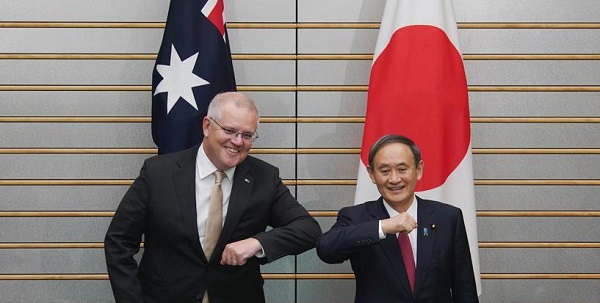Japan- Australia Defence Agreement

This topic of “Japan- Australia Defence Agreement” is important from the perspective of the UPSC IAS Examination, which falls under General Studies Portion.
Background:
- In the aftermath of World War II, the security order in Asia and the Indo-Pacific region was marked by bilateral ties of various players with the USA.
- This can be contrasted with the US strategy in Europe, where a more multilateral NATO defined the security order.
- This seems to be changing with the rise of a more assertive Beijing– as can be seen from the activities of QUAD, AUKUS and now, the new Reciprocal Access Agreement between Australia and Japan (treaty allies of the USA).
What is the agreement about?
- The Japan-Australia Reciprocal Access Agreement/ RAA is a defence treaty that was concluded between the Prime Minsters of Japan and Australia at an online summit.
- This agreement establishes procedures for cooperative activities by the defence forces of the 2 countries while visiting each other’s territory.
- It also defines the status of the visiting defence force.
- It seeks to promote bilateral defence and security cooperation between the 2 countries.
How has this come about?
- Among the many factors that has enabled this landmark agreement, Australia’s willingness to stand up China on several issues, despite their significant economic relations, is a key factor. Australia has been reiterating its support for a rules based international order and a free and open Indo Pacific.
- Japan has been evolving its outlook, as well as its global image.
- Japan has been steadily increasing its defence spending over this a decade. For instance, the country’s 2022-23 budget proposes a record high figure for its military.
- China has become increasingly assertive in the Indo-Pacific region.
Why is it significant?
- This has been hailed as a landmark agreement for its provides a clear framework for improved cooperation and interoperability between the 2 countries.
- It holds strategic significance for the dynamic Indo-Pacific region.
- Till now, the USA has been Japan’s only major defence partner. This reluctance of Japan in the strategic domain was driven by World War II legacy and the fact that many countries in the region were wary of it because it had been an imperial power.
- However, Philippines and Vietnam have started looking at Tokyo as a bulwark against Chinese aggression in the region. This is an indication of greater acceptance of Japan as a strategic player by other countries in the region.
- China’s reaction to the new agreement has ranged between ambivalent to negative.
- The agreement is highlights how the Chinese’ aggressive stance has driven the middle powers to expand their cooperation and build on the momentum generated by the QUAD.
What is the way ahead?
- The RAA is cementing trends that are producing a changing security architecture in the Indo-Pacific.
- It marks a shift away from the traditional US-centric outlook to draw more focus on regional groupings and bilateral ties.
- It signals Japan’s willingness to play a more proactive role in the Indo-Pacific. Tokyo is reported to be seeking similar defence treaties with France and the UK.
- All of this points to a more committed and empowered regional strategic network.
- India, for its part, has contributed much to expand cooperation in the security domain- be it bilateral, trilateral or multilateral. For instance, it has organized 2+2 ministerial dialogues with both the countries.
- India would do well to step up similar engagements with other players in the region.
Referred Sources

